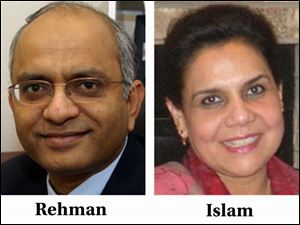
Area Muslims deplore embassy attacks, deaths
9/13/2012
Local Muslim leaders expressed deep sadness on Wednesday over the attacks in Libya and Egypt that resulted in the deaths of a U.S. ambassador and three other Americans, while also condemning a video that apparently sparked the violence as offensive to Muslims.
A mob in Cairo stormed the walls of the U.S. Embassy in Cairo on Tuesday after a trailer for a video called Innocence of Muslims was publicized in recent days by the Egyptian media.
Ambassador J. Christopher Stevens was killed in Benghazi during protests initially linked to anger over the video, which lampoons the Prophet Mohammed.
Leaders in the Toledo Muslim community said the video is deeply offensive and were not surprised that its online release sparked anger, but said that the violence was irrational and tragic.
“The reaction that happened is unacceptable,” United Muslim Association of Toledo’s President Dr. S. Maseeh Rehman said. “It’s absolutely madness to go and kill innocent people.”
The video among other things depicts the Prophet Mohammed as a homosexual and a child molester.
Dr. Mahjabeen Islam, president of the Islamic Center of Greater Toledo, said she had trouble sleeping Tuesday night after she viewed the film’s trailer, which she called deeply offensive.
Muslims don’t believe in depiction of the Prophet Mohammed in any form to avoid idolatry, but the film went beyond simple depiction, she said.
“It’s not just a depiction, and it’s not humorous,” she said, adding the offensiveness didn’t excuse the violence. “I don’t even want to describe it. It is indescribable.”
The violence harkened to riots in 2005 after cartoons of the Prophet Mohammed were printed in a Danish newspaper or the 2011 burning of a Qu’ran by Christian pastor Terry Jones.
But whatever the offense, violence is not an acceptable response, Dr. Rehman said.
The attacks in Libya and Egypt won’t get what the protesters want, and instead may lead to more anger, and ironically, more exposure for the film.
“Killing will never solve these problems,” he said. “It will never take us anywhere.”
While both attacks were linked to anger over the film, the countries where they occurred have featured extreme political instability in recent months, said Dr. S. Amjad Hussain, a retired surgeon who is a column contributer for The Blade.
The revolutions that overthrew regimes in both countries — largely peacefully in Egypt, violently in Libya — have left security and power voids. Extremists can use those voids to exploit anti-American sentiments that exist in much of the Muslim world over American foreign policy and military actions, he said.
Those extreme views stoke volatile climates that can explode when affronts to religion are added.
“Any kind of perceived religious provocation would give substance to those people who are against America to begin with,” he said.
American Muslims love their country, Dr. Islam said, and know of the constant struggle between freedom of speech and tolerance of religion in the United States, so they can react more rationally.
Living in America gives Muslims the freedom to express offense to perceived slights against their faith through dialogue and interaction.
Just because he may be offended by the video, Dr. Hussain said, doesn’t mean he will take to the streets in rage, and he noted that there have been no mass protests in Toledo over the video or cartoons or other perceived insults.
That Mr. Stevens and the other Americans killed had no connection to the video made their deaths all the more egregious, Muslim leaders said.
Some feared that the video could lead to more violent protests. Others worried about attacks against American Muslims in revenge.
“Innocent killing leads to more innocent killing,” Dr. Rehman said. “The end result is everyone is the loser.”
Contact Nolan Rosenkrans at: nrosenkrans@theblade.com or 419-724-6086.